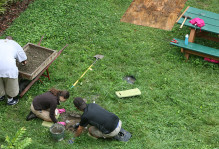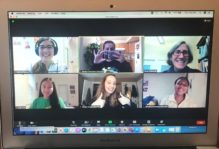Chaguite Community Meeting
Leading the way: Alex Ferraro, Lester Chavez, Ruby Langeslay, Yardley Albarracin, and Gabi Arias. Alternately sitting, standing, and walking into the audience of Chaguite residents, these MANOS leaders introduced the purpose of the meeting, invited participants to introduce themselves, briefly summarized our accumulating research results, and invited residents to tell us about their health and health care concerns. We knew from our pre-meeting interviews that some residents would prefer that we not limit our focus to clinical or medical issues. Our speakers (Alex, Lester, et al) explained that we care very much about the range of issues that affect the daily lives of residents. At the same time, our first concern is to build from the platform of our annual clinic. We understand that a week-long, annual clinic does not provide sustained solutions to health and health care problems. Still, it’s the first and basic commitment that we’ve made and, from the beginning, we have explained that our strength is in building on that basic resource. We heard from residents that they appreciate the commitment and our efforts to understand their experiences and needs through our research. We heard that some believe that any workable solution will need to improve the natural environment — AND include economic opportunities that will generate new resources. We heard, and we understand and believe. One of our developing theoretical notions centers on the necessity for generating new resources in any effort that intends to be sustainable.
While the speakers led discussions and responded to questions, teammates were busy taking notes and making systematic observations. As a result, we have a lengthy and detailed description of the meeting, the oral comments, and the interactions. Our method involved multiple note-takers and multiple observers with overlapping observation zones. We collated the notes and observations to create an integrated transcript of the meeting. We will extract data from the transcript using both a manual coding process and a content analysis software, and then compare the results for further analysis.
It appears that the meeting was a success. We reached agreement on core ideas that should inform a plan to develop and implement projects, collaborative efforts between the community and MANOS. We will return in May to continue these discussions, moving towards more concrete and specific ideas, and culminating in a 3-5 year plan with specific goals, objectives, tasks, time lines, and strategies for assessment. We learned in the course of the discussion that a major concern among the residents was that they believed that our plan was to pick a single project, work on that for a short time, and then leave the community. We assured them that our intention is to develop a plan so that we can work more effectively with them — to make the best use of time and talents we can on the way to sustainable strategies and solutions.
I believe that those of us representing MANOS — students, physicians, and I — would agree that there was a shared sense of accomplishment and hope at the close of the meeting. So much work lies ahead, but for that moment there is a clear vision of where we started and where we’ve arrived. We returned late to the hostel, determined to tidy up notes, extract data, and prepare for the next day’s research and clinic. Alas.
We returned late in part because it took some time to run the shuttle up and down the mountain to provide rides back to the vicinities of the residents homes. In part, we were late because the research team vehicle was called upon to serve as a stand-in ambulance. We learned that a pregnant woman was having pain and potential complications and needed a ride down the mountain to the Totagalpa clinic. We arrived at the pickup point to discover that a brigadista (medical volunteer) had run from another community to get help for a man who had cut his arm badly with a machete. We left the pregnant woman to wait our return and headed off to Buena Vista. The road to Chaguite is steep and, in places, barely passable. The road to Buena Vista is a little worse. Our earlier impression was that the man had amputated his arm. We arrived to find a man in some pain, but with the arm attached and the bleeding substantially stopped. We loaded up, headed back to the pickup point, collected the pregnant woman and her friend, and headed down the mountain. We arrived at the Totagalpa clinic at about the same time as the 15 passenger van with the main group of MANOS students and the docs.
There were no physicians at the clinic, so our intrepid doctors proceeded with emergency care: cleaning and stitching the deeply cut arm — without anesthesia. To say that the victim was stoic would be one of the day’s grander understatements.
I will admit to a certain warm, tired satisfaction on return to the hostel. Good intentions ARE dangerous — and in this case did not result in the night of work that we had imagined. Enough said.
Reflecting on these events at this moment in the semester, it is clear to me — and I hope to the MANOS crew — that we accomplished all that we had hoped for in this year’s project trip. There is so much more to be done before we return (as a small group of maybe four or five) in May. But we have reached a moment in the project that five years ago we could only imagine in our most hopeful moments. I am enormously proud of the students who are MANOS. They have displayed a level of dedication, commitment, intelligence, training, and willingness to sacrifice that is beyond reasonable — and absolutely necessary to the goals they set at the beginning.
The Tona award was presented on our last night in Ocotal — to the graduating seniors: Gabi Arias, Soyoung Hwang, Jackie Ramirez, Margaret Summers, Molly Copeland (plus, in absentia, Ashley Ingram). Some may have thought this a cop-out (I had the responsibility for this day’s award), but I cannot conceive of a more deserving recipient. Each in her own way has contributed to the success of MANOS; has done more than anyone should ever expect; has lived, and loved, and carried MANOS on her shoulders and in her heart; and has brought us to this moment when we can act on grounded, informed, and empirically vetted intentions.



No comments.
Comments are currently closed. Comments are closed on all posts older than one year, and for those in our archive.